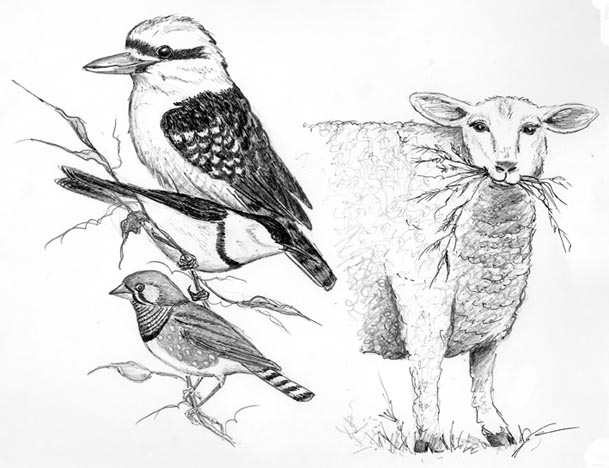
Dear Bird Folks,
My wife and I are planning a trip to New Zealand and Australia in January. We will be doing mostly tourist things, but I’d also like to do some casual birding. Since we only have three weeks, I’m wondering if you have any thoughts as to which country has the best birding, so I can schedule more time for that country.
– Stu, Bakersfield, CA
It’s Australia Stu,
Australia, Australia, Australia. If you want to go birding, Australia is the country you want to go to. New Zealand is fine if you want to see sheep, rugby players, furry fruit or Lord of the Rings remains, but for birds Australia rocks. Now don’t get me wrong, New Zealand is a wonderful country. The people are very nice and the scenery is stunning. It’s a great place to live, but you wouldn’t want to visit there, at least for casual birding.
Part of the problem is that NZ is a fairly small country. It ranks 75th in total area, just below everybody’s favorite country, Burkina Faso. (Yup, look it up. Burkina Faso is a real country.) The other problem is that NZ is an island, and an isolated island at that. At first its isolation was a good thing. There were no humans to screw things up. Except for the occasional bat, there were no land mammals of any kind, not even a squirrel. Birds were the highest life from. I’ve always said “birds rule,” and in this case they actually did.
Since there were no land predators to keep them on their toes, many of the birds didn’t bother learning to fly. In fact, one bird, the moa (not to be confused with Mall _of America), didn’t even bother growing wings of any kind. Other flightless birds, like ostriches and penguins, still have small wings but not moas. They wanted nothing to do with growing wings. They just got fat and lazy, reaching weights that exceeded 500 lbs.. When the first humans, the Polynesians, finally discovered NZ they were thrilled to find the yummy, flightless moas. The days of bird rule were quickly coming to an end.
Next came the European settlers who brought with them everything European settlers are famous for, clear-cuts, sheep, rats, cats, and of course more Europeans. Since NZ is an island, there was no place for the birds to escape to. All too quickly NZ’s array of unusual birds either became extinct or were pushed to the brink.
Today New Zealand is in the forefront of species protection. It is desperately trying to save the flora and fauna that remains. Birders who are willing to make the effort may still be able to get a glimpse of the few unique birds which have survived, including the symbolic kiwi. Most tourists however will have to be content with seeing sheep or many of the imported birds that have displaced the once common native species.
Australia, which of course was also invaded by Europeans and sheep, has been able to hang-on to much of its original wildlife because of its vast size. Like New Zealand, Australia is an island, but it’s a huge island, a continent to be exact. It is filled with snakes, dingoes, and other scary things that kept the birds wary and thus most learned to fly. No doubt some species populations have suffered because of the influx of humans, but many have taken advantage of what the humans introduced: crops, cultivated fruit and vegemite factories.
Australia has every kind of habitat you can think of, from tropical rain forests in the north to beaches for nesting penguins in the south. With nearly 800 species of birds, Australia should provide even the most causal birder with great looks at some pretty funky looking birds. Birds like cockatoos, cockatiels, budgies, and Zebra Finches can be seen flying free over the countryside, instead of being kept in cages like they are in this country. And let’s not forget the kookaburras. I really like those guys. They laugh at every one of my jokes.
When it comes to choosing a country for casual birding, Stu, it’s hard to beat Australia. Even though it’s a foreign country you can rent a car and go off birding on your own because all the signs are in English. Just remember that the signs might be in English but don’t asking an Aussie for directions, because you won’t understand a word they say.
I hope I didn’t turn you off on New Zealand,. It’s a great country, it’s just that the birding is a bit more challenging than it is in Australia. But on the plus side remember that I said New Zealand doesn’t have squirrels. That alone should attract about half the people I know.